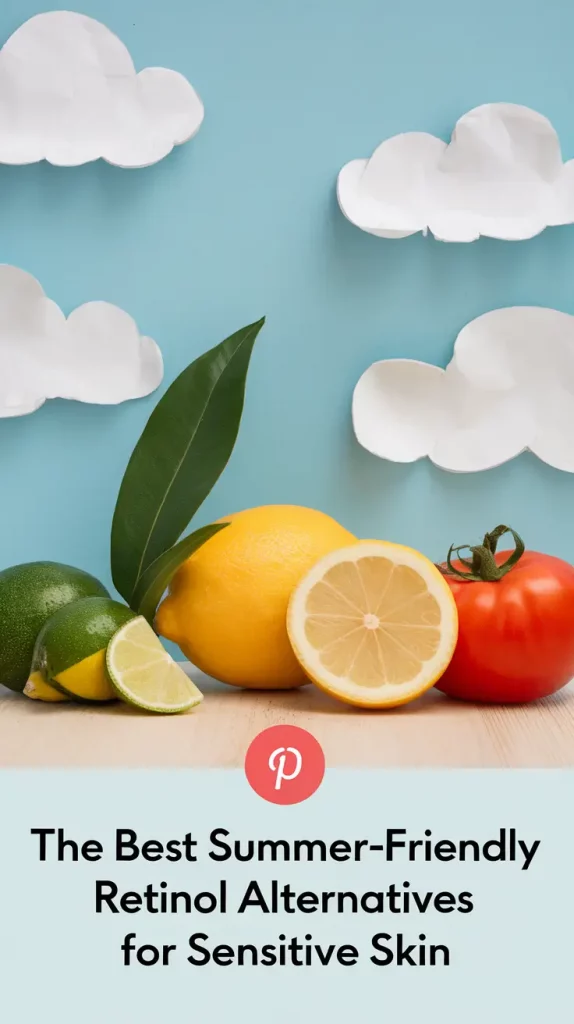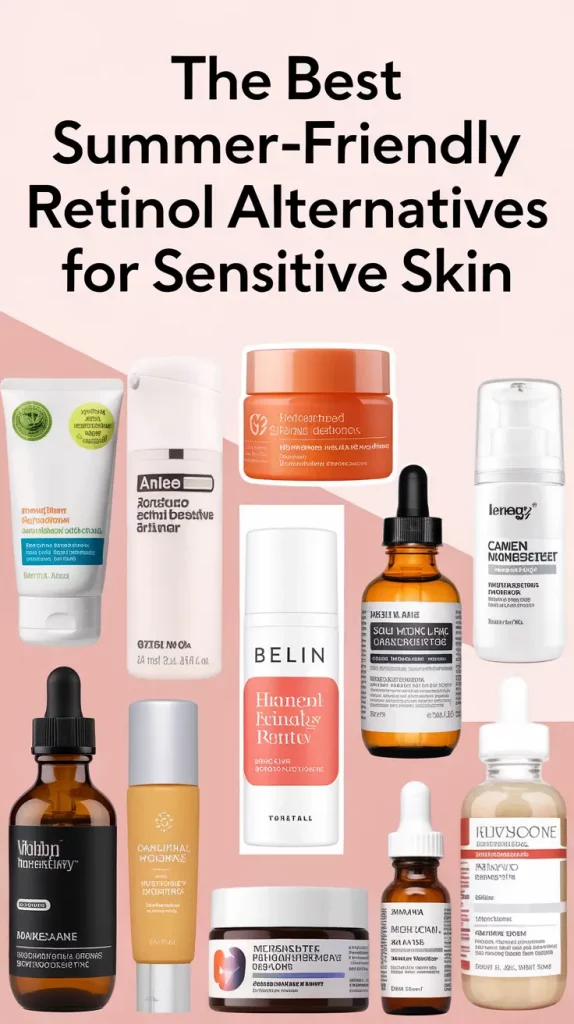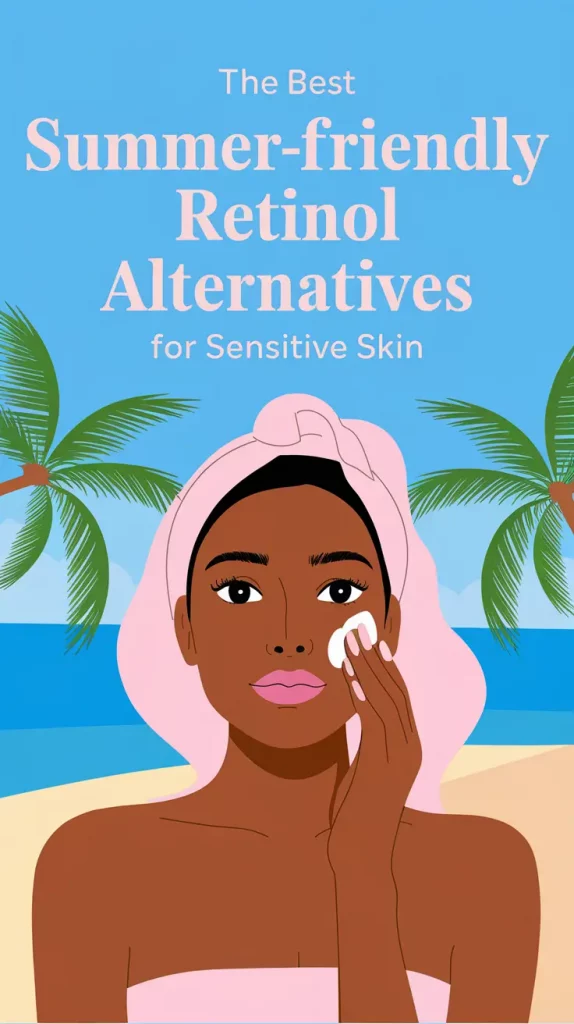Best Retinol Alternatives for Sensitive Skin This Summer
It hit me on a warm June morning. For months, my skin was clear and glowing, but then it turned red, blotchy and tight very quickly. I hadn’t changed anything major. I was sticking to the same retinol serum and adding sunscreen to my face every day. But something wasn’t working anymore.
Most people don’t mention that retinol is powerful, but it works well only when used correctly. Summer, thanks to its heat, too many UV rays and unpredictable sweating, isn’t always a favorite. Especially if you’ve got sensitive skin.
If your skin starts to react badly to your usual skincare routine as summer comes, you’ll find this post helpful. I’m sharing some smart, gentle options to retinol that help you maintain your glow, without causing irritation, peeling or worry about the sun. I have gone through the process of testing, researching and learning, so you don’t have to.

Why classic retinol doesn’t always play nice with summer
The thing that kept my skin smooth during winter turned out to be the reason it became worse in summer. Retinol seems to make your skin more sensitive to the sun, even if you apply it at night. If your skin is already sensitive, summer can make your redness, dryness or reactivity much worse.
What makes retinol tricky in the heat:
- It speeds up cell turnover — great for glow, but risky under strong UV exposure
- It can thin the skin barrier over time if overused
- It doesn’t mix well with increased sweat, friction, or inconsistent SPF
I learned this when I found myself slathering on SPF 50 three times a day and still getting patchy spots and irritation. That’s when I knew I needed a new approach.
What actually works instead of retinol in the summer
This is where it all shifted. I stopped chasing that dramatic “peel to reveal” feeling and started looking for ingredients that respected my skin’s boundaries — especially under the sun. The goal? Keep the benefits (glow, firmness, clarity) without the stress.
What to look for in a summer-friendly retinol alternative:
- Gentle exfoliation or cell renewal
- Anti-inflammatory or barrier-repair properties
- Safe for day use and non-photosensitizing
- Proven to work over time — no overnight miracles, but real results
I went through a handful of trials, and only a few products passed the test. But those few changed everything.
My top 3 summer retinol alternatives that saved my skin
Let me show you what actually worked for me. These three gave me clear, hydrated, happy skin — with zero sun panic.
1. Bakuchiol – Nature’s kindest retinol alternative
At first, I was skeptical. A plant that works like retinol? But bakuchiol surprised me. It’s antioxidant-rich, stimulates collagen, and reduces fine lines — without irritation or sensitivity. My skin felt calm, smooth, and just…balanced. No flare-ups. No flaking.
2. Peptides – The quiet powerhouse
Think of peptides as little skin coaches — they train your cells to rebuild collagen and stay firm. They don’t exfoliate, but they support the structure and improve texture over time. I used a peptide serum every night for two weeks, and my skin started looking more rested and plump.
3. Azelaic acid – The multitasker for redness + texture
This one’s a game changer if you have rosacea or acne-prone skin. It fights inflammation, clears out pores, and brightens without making you photosensitive. I used it in the mornings under SPF, and it doubled as a calming primer.

How I transitioned my skincare without freaking out my skin
This part matters more than the products themselves. Swapping actives isn’t just plug-and-play. It’s a rhythm.
3 steps that helped me make the switch smoothly:
1. Gave my skin a one-week break from all actives
It was scary at first — like I was giving up progress. But that pause helped reset inflammation and rebuild my barrier.
2. Introduced new ingredients one at a time
I started with bakuchiol twice a week, then layered in peptides at night and azelaic acid in the morning.
3. Stayed consistent but minimal
Less was more. I stuck to gentle cleansers, light hydration, and only one active per routine.
The results didn’t come overnight, but within a month, my skin tone evened out, and I wasn’t constantly reaching for concealer.
Comparing the switch: Retinol vs. Summer Alternatives
Sometimes it’s easier to see it all laid out. So here’s a quick snapshot of how my summer swaps stack up:
| Feature | Retinol | Bakuchiol | Peptides | Azelaic Acid |
|---|---|---|---|---|
| Skin renewal | ✅ High | ✅ Moderate | ➖ Indirect | ✅ Moderate |
| Works on fine lines | ✅ | ✅ | ✅ | ➖ Slightly |
| Sun sensitivity | ⚠️ High | ✅ None | ✅ None | ✅ None |
| Suitable for sensitive skin | ⚠️ Often not | ✅ Yes | ✅ Yes | ✅ Yes |
| Pregnancy-safe | ❌ Not advised | ✅ Yes | ✅ Yes | ✅ Yes |
| Inflammation risk | ⚠️ Possible | ➖ Very low | ✅ None | ➖ Low |
Would you ever try swapping your retinol for one of these?
Mistakes I made before finding what works (so you don’t have to)
Here’s where I got it wrong — and what I learned.
Common mistakes to avoid when switching actives:
- Jumping into new products too quickly
Your skin needs time to adapt. One ingredient per week was my new rule. - Layering multiple actives without buffering
Even gentle ones can clash if not spaced out. I had to rethink my order of application. - Assuming “natural” means “safe”
I once reacted badly to a botanical blend that was too fragrant. Always patch-test. - Neglecting SPF
Even if your actives aren’t photosensitizing, the sun still stresses out sensitive skin.
This was the mindset shift: I stopped chasing quick results and started supporting my skin’s long game.
Who should try these summer-safe alternatives?
You might love these options if:
- You’ve ever experienced burning or redness with retinol
- You’re pregnant or nursing and want gentler options
- You live in a sunny, humid climate
- You’re rebuilding a compromised skin barrier
- You want smoother skin without the “retinol purge”
Here’s the part I didn’t expect:
My skin did much better this summer without retinol than I expected. There are fewer outbreaks, less redness and the skin is smoother and even. I even felt comfortable going makeup-free more often.
Sometimes, backing off doesn’t mean giving up. It’s about letting your skin tell you what it needs and working alongside it.
Final thoughts: glow smarter, not harder
I once thought retinol was the best choice for everyone. Now I know better. Since skincare needs are different in every season, there is no universal solution. What matters most is understanding what your skin needs right now and adjusting with care, not fear.
If you are young and new to skincare or if your skin is sensitive in your older years, these easy changes can help you see results, without giving up anything.
📌 Save this if you want to reboot your summer schedule.
💬 Has there been one skincare change that made a huge difference for you?
🧴 Store this guide if your skin acts up whenever it gets hot.

